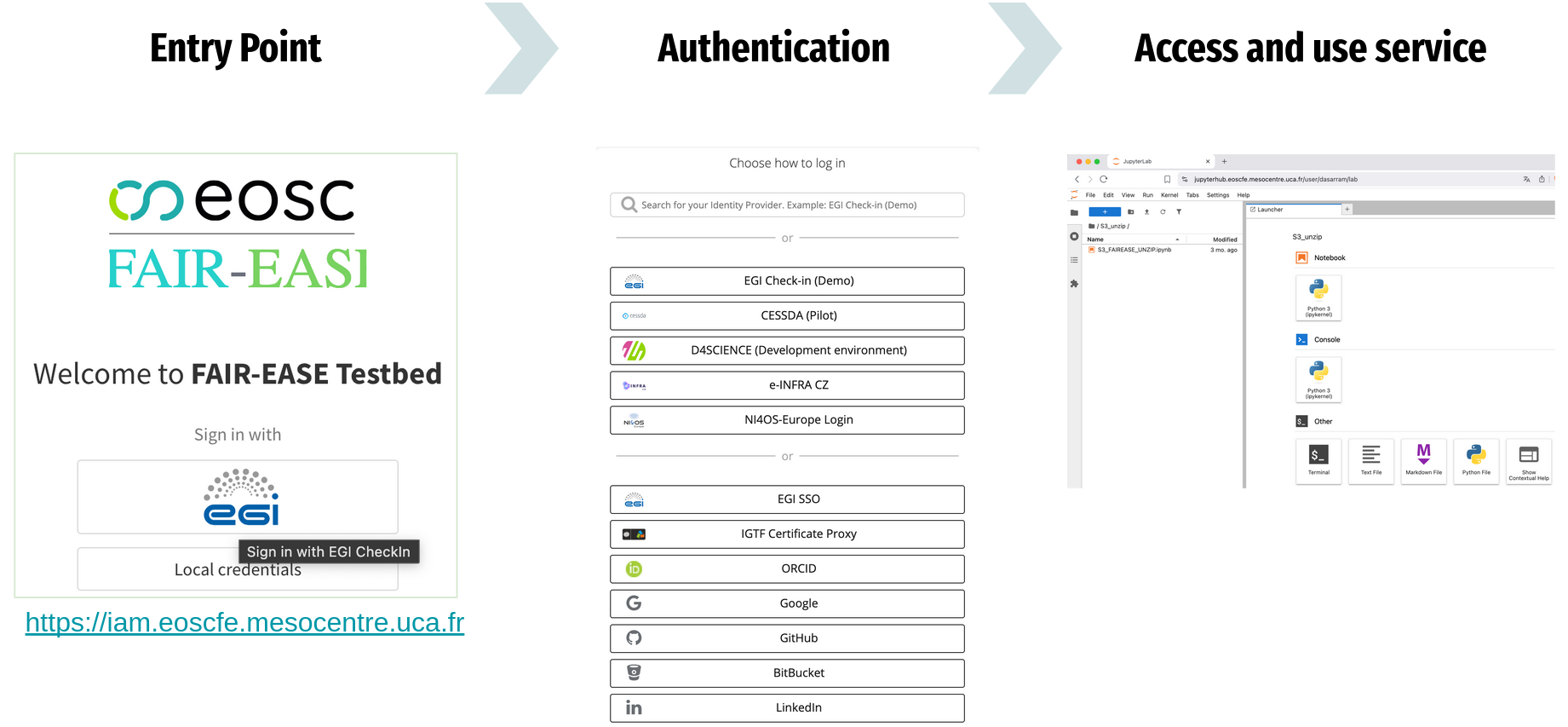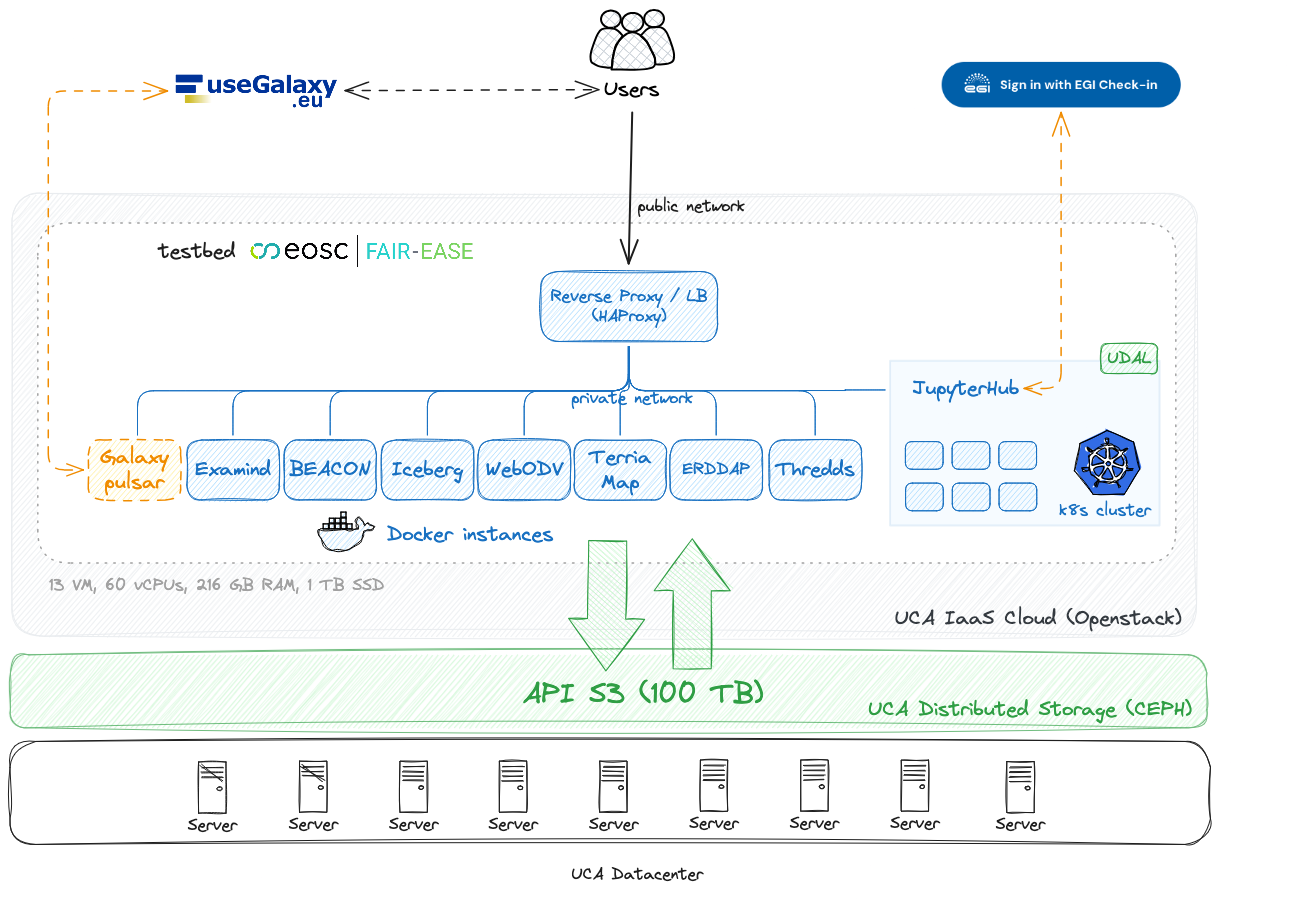Since mid-2024, we have been working on the implementation of an EAL at Université de Clermont-Auvergne (UCA), building upon its existing hardware infrastructure. This infrastructure also hosts the FAIR-EASE data lake, as described in Deliverable D4.5 - Deployment of the data lake: operational version.
The EAL FAIR-EASE@UCA remains in an incubation phase but is
progressively taking shape through key developments. Notably, it has
been interfaced with the EGI Check-in SSO service to support federated
authentication and has integrated an S3 object storage
(s3://

Figure 1:Accessing JupyterLab on UCA via EGI CheckIn
All the services are accessible through a webpage https://
Here are the services deployed:
| Building block | Service | URL |
|---|---|---|
| Data Access | Examind Community | https://examind.eoscfe.mesocentre.uca.fr/examind/ |
| Thredds | https://thredds.eoscfe.mesocentre.uca.fr/ | |
| ERDDAP | https://erddap.eoscfe.mesocentre.uca.fr | |
| Beacon | https://beacon-argo.eoscfe.mesocentre.uca.fr/ | |
| Data Analysis | WebODV | https://webodv.eoscfe.mesocentre.uca.fr/ |
| TerriaMap | https://terriamap.eoscfe.mesocentre.uca.fr/ | |
| JupyterHub/Lab | https://jupyterhub.eoscfe.mesocentre.uca.fr/ |
Strengths and areas for improvement¶
| EAL Implementation | Strengths | Areas for improvement |
|---|---|---|
| Galaxy for Earth System | - Galaxy as PaaS - Galaxy Pulsar integration - Galaxy Training Materials - CI/CD with GitHub - Community-based contributions | - Implement user group management features - Enhance integration for discovering and accessing geospatial reference datasets |
| D4Science | - Integration of various services (discovery, access, analysis) - Catalogue and publication mechanisms - Group management (VLAB, VRE, landing pages) - Collaboration tools | - S3 API direct access for better tool/service integration and support for HTTP Range - Streamline deployment of new services by external teams |
| FAIR-EASE@UCA | - S3 storage (reference data, userspace) - Deployment of new services - Integration of access and analysis workflows - Links to other EALs (e.g., Galaxy Europe via Pulsar) | - Design a landing page for better user entry points - Implement group and collaboration management features - Develop a dedicated service catalogue in connection with the EOSC node federation |

Figure 2:UCA testbed infrastructure
Conclusion¶
Over the course of the project, FAIR-EASE has achieved a series of notable results that have contributed to both technological progress and community engagement across multiple scientific domains.
FAIR-EASE has exploited existing solutions and successfully adapted them to new domains and contexts, demonstrating the versatility and robustness of tools such as Galaxy and webODV for data analysis services. These technologies, initially designed for specific communities, have been enhanced to meet broader scientific needs, promoting interoperability between fields. At the same time, FAIR-EASE has fostered innovation by introducing new concepts and tackling technical challenges. The development and implementation of principles such as UDAL and EAL reflect this commitment to innovation. Collaboration has been the cornerstone of this success. FAIR-EASE fostered close interaction between internal partners while building bridges with external initiatives.
FAIR-EASE has also played a key role in disseminating good practice, particularly in improving the fairness of data, software and processes. In response to the growing demand for sustainable computing, FAIR-EASE has also advocated for remote data processing to minimize unnecessary data transfers. By supporting standards and technologies such as OGC API:Processes, S3/ARCO formats, OpenEO, and Galaxy Pulsar, the project has paved the way for more efficient and scalable processing approaches. By integrating these principles into tools and workflows, the project has helped to improve the overall quality and sustainability of research products.
The project has provided integrated e-infrastructures (EAL) that support large-scale collaborative science, enabling users to move from one to another EAL through a system of systems approach, using common federated capabilities. Platforms such as Galaxy for Earth System Science, FAIR-EASE@D4Science and the FAIR-EASE@UCA have provided pilots with robust environments for experimentation, sharing and validation.
Finally, FAIR-EASE has produced a significant number of KERs[27], each contributing tangible value to the scientific and technical communities. These results are not only deliverables but also stepping stones for further innovation, adoption, and impact beyond the lifetime of the project.